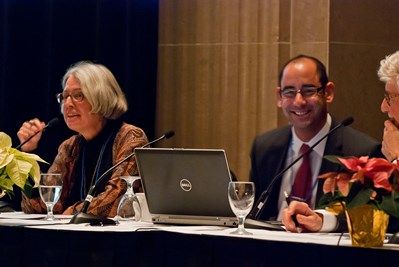
The intersection between work and family life is one of the most challenging issues confronting the law of the workplace. On February 17–18, Queen’s Centre for the Law in the Contemporary Workplace (CLCW) is co-sponsoring a symposium, “Law, Work and Family Care,” to discuss how the law currently addresses these issues and how it can be reshaped.
“The problem the symposium focuses on is the clash between work and family, between production and reproduction and the issue of what discrimination on the basis of family status means for the Canadian workplace,” says Elizabeth Shilton, Senior Fellow for the CLCW.
Previously, family care issues were treated as purely private matters. “This is no longer realistic,” says Shilton. “The breakdown of the male breadwinner family and the fact that women are now in the workforce in almost equal numbers to men make it no longer possible for employers and policy-makers to leave solutions to the family care problem in the private realm. These are clearly issues with significant public dimensions.”
“What makes it a hot issue for lawyers is the impact of provisions in human rights codes prohibiting discrimination on the grounds of family status,” she continues. “In what ways do these require employers to reorganize workplaces and revisit workplace rules that have been standard for more than a century? Recent federal court decisions have highlighted the potential for dramatic and disruptive change.”
Speaking at the symposium will be a wide variety of academics, lawyers and policy-makers from Canada and elsewhere. “The objective is to bring together lawyers and social scientists to discuss the problems,” Shilton says. The keynote presentation, given by Nora Spinks, CEO of the Vanier Institute for the Family, will give an overview of changes in family life and the issues that those changes raise for work and workplaces. Six panels will discuss topics such as the status of precarious workers, the limits of litigation and how law can and should evolve to accommodate family care in the workplace.
People who will benefit from the symposium include: lawyers dealing with workplace family status discrimination problems, union professionals and members involved in work/family issues, workplace human rights professionals, human resource management professionals, academics in law and the social sciences, government employees and policy-makers involved in work/family issues and in-house and corporate counsel dealing with employment issues and accommodation.
Taking place at York University, Toronto, from February 17–18, the symposium is hosted in partnership with Comparative Research in Law & Political Economy at Osgoode Hall Law School, the Women’s Legal Education and Action Fund (LEAF) and the Canadian Human Rights Commission.
For more information and to register online, visit the CLCW website.
By Anthony Pugh